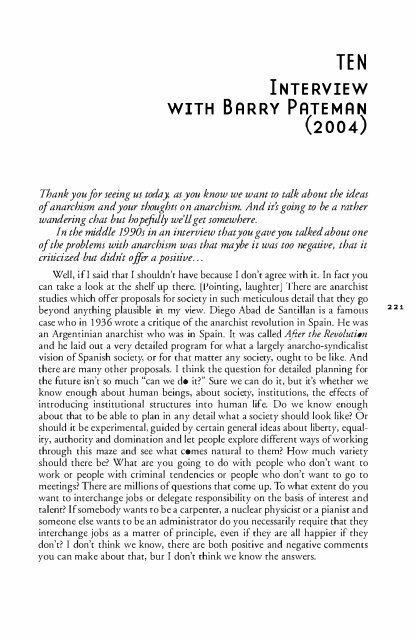Chomsky on Anarchism.pdf - Zine Library
Chomsky on Anarchism.pdf - Zine Library
Chomsky on Anarchism.pdf - Zine Library
You also want an ePaper? Increase the reach of your titles
YUMPU automatically turns print PDFs into web optimized ePapers that Google loves.
TEN<br />
INTERVIEW<br />
WITH BARRY PATEMAN<br />
(2004)<br />
Thank you for seeing us today, as you know we want to talk about the ideas<br />
of anarchism and your thoughts <strong>on</strong> anarchism. And its going to be a rather<br />
wandering chat but hope folly we'll get somewhere.<br />
In the middle 1990s in an interview that you gave YOlt talked about <strong>on</strong>e<br />
of the problems with anarchism was that maybe it was too negative, that it<br />
criticized but didn't offer a positive ...<br />
Well, if! said that I shouldn't have because I d<strong>on</strong>'t agree with it. In fact you<br />
can take a look at the shelf up there. lPoiming, laughterJ There are anarchist<br />
studies which offer proposals fo r sociery in such meticulous detail that [hey go<br />
bey<strong>on</strong>d anything plausible in my view. Diego Abad de Santillan is a famolls<br />
case who in 1936 wrote a critique of the anarchist revQluri<strong>on</strong> in Spain. He was<br />
an Argentinian anarchist who was in Spain. It was called After the Revoluti<strong>on</strong><br />
and he laid out a very detailed program for what a largely anarcho-syndicalist<br />
visi<strong>on</strong> of Spanish society, or for [hat mauer any society, ought to be like. And<br />
there are many other proposals. I think the questi<strong>on</strong> fo r detailed planning for<br />
the future isn't so much "can we do it?" Sure we can do it, but it's whether we<br />
know enough about human beings, about society, instituti<strong>on</strong>s, the effects of<br />
introducing ins[iuai<strong>on</strong>al structures into human life. Do we know enough<br />
abom that to be able to plan in any detail what a society should look like? Or<br />
should it be experimental, guided by certain general ideas about liberty, equality,<br />
amhoriry and dominati<strong>on</strong> and let people explore different ways of working<br />
through this maze and see what comes namral to them? How much variety<br />
should there be? What are you going to do with people who d<strong>on</strong>'t want to<br />
work or people with criminal tendencies or people who d<strong>on</strong>'t want to go to<br />
meetings? There are milli<strong>on</strong>s of questi<strong>on</strong>s that come up. To what extent do you<br />
want to interchange jobs or delegate resp<strong>on</strong>sibility <strong>on</strong> the basis of inrerest and<br />
talent? If somebody wants to be a carpenter, a nuclear physicist or a pianist and<br />
some<strong>on</strong>e else wanrs to be an administrator do you necessarily require that they<br />
interchange jobs as a mauer of principle, even if they are all happier if they<br />
d<strong>on</strong>'t? I d<strong>on</strong>'t think we know, [here are both positive and negarive commenrs<br />
you can make about that, bur I d<strong>on</strong>'t think we know the answers.<br />
221

















